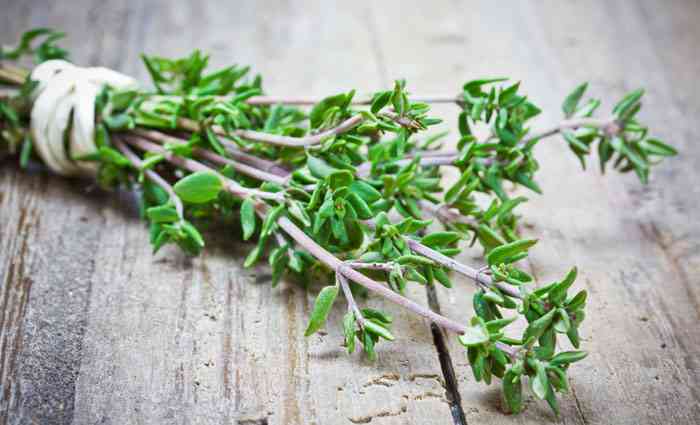Thyme: An Aromatic Super Spice
By Krista DeKuyper | April 30, 2018 |

Welcome to this eighth article in our “Healthy Spices” series. Today we take a look at thyme, a very healthy spice that has been in use for thousands of years due to its culinary and medicinal properties.
Did you know that the word “thyme” may have derived from the Greek word thymus, which means “courage”? In fact, in days of old it was common for knights to wear sprigs of thyme on their armour as a sign of their bravery. Whether or not the smell of thyme granted them an extra dose of courage during battle, however, is debatable.
What we do know, however, is that it is time to learn about thyme!
What is Thyme?
Thyme is a low-growing evergreen shrub that is a member of the mint family.
There are actually many different species of thyme that belong to the Thyme genus. Just some examples are lemon thyme (Thymus citriodorus), caraway thyme (Thymus herba-barona) and creeping thyme (Thymus serpyllum), to name a few.
The thyme that is commonly found in kitchens, though, comes from the leaves of the species Thymus vulgaris, and is often called “common thyme”1.
Thyme comes in many different forms such as fresh leaves, crushed dried leaves and flowers, a powder, an essential oil and as an extract.
Historical Uses of Thyme
Almost all ancient societies have used thyme in some form or manner.
The Egyptians used thyme during the embalming process thousands of years ago. They also used thyme for pain relief in many of their medicines.
The Greeks burned thyme as incense in their temples and homes. It smelled good and was also supposed to evoke courage when inhaled)2.
During Roman times some people ate thyme before or during a meal to protect themselves from poisoning. (We’re not sure how well this worked and don’t feel like putting it to the test)!
Thyme was also popular during medieval times, and as previously mentioned knights adorned their armour with sprigs of thyme for courage.
During the Victorian age some folks interpreted patches of thyme in the woods as signs that fairies had been dancing at night in that very location.
Besides these more esoteric uses, thyme has also been used for thousands of years as a food spice and as an ingredient in various medical concoctions. Some of these “medical” potions were based more on wishful thinking and less on real, scientific reality. However, having said this, there can be no denying that thyme does have very real medicinal properties.
Nutritional Properties of Thyme
Thyme is a good source of vitamins A and C. It also contains significant amounts of riboflavin, as well as iron, manganese, copper potassium and zinc.
Thyme is also a good source of dietary fiber.
Medicinal Properties and Health Benefits of Thyme
Thyme has traditionally been used to treat a wide variety of ailments throughout history.
Just some of the things thyme has been used for are diarrhea, respiratory ailments such as whooping cough and bronchitis, excessive flatulation and acne. Thyme oil was also used to treat bandages before being applied to a wound in order to prevent infection.
Thyme’s health benefits are due in great part to the volatile oils it contains such as borneol, geraniol, carvacol and most importantly, thymol.
Thymol and the other volatile oils are naturally-occurring biocides, which are substances that can destroy harmful organisms.3
The following are just some of the medicinal properties and health benefits of thyme (note that we include all varieties of thyme, not just the common variety):
- The volatile oils in thyme have powerful antiseptic, antibacterial, and antifungal properties.
- A study done by the University of Brighton indicates that Thyme essential oil can kill the MRSA hospital superbug within two hours of being applied without any adverse effects on the skin.4
- Mastic thyme extract may protect people from colon cancer.5
- Thyme has high amounts of Phenolic antioxidants that reduce the free radicals in the body, thereby lessening the cellular damage caused by free radical activity.6
- It has been used to successfully treat acne and fungal infections.
- Thyme helps to improve blood circulation.
- Thyme’s volatile oils are anti-microbials and are effective against all sorts of bacteria (and fungi) such as Staphylococcus aureus, Bacillus subtilis, E. coli, and Shigella sonnei.
- According to Science Daily, thyme herbal preparations may be more effective then prescription creams when it comes to treating bacterial acne.7
- Thyme is often used in natural cough medicines. A study published in by the NCBI8 found that a combination of thyme and ivy leaves used to treat acute bronchitis outperformed the placebo it was tested against.
- Monoterpenes (a class of terpenes) that are derived from thyme essential oil have been show to be effective mosquito repellants and are on par with DEET-based repellants9.
- Thyme’s high vitamin and mineral content also helps to boost the immune system.
Cooking with Thyme
Thyme is a very pungent spice that can have a big impact when added to a recipe.
Thyme goes well with lamb, fish and tomato sauces. It is also very good when added to a stew (thyme is a main ingredient in Irish stew, for example).
It is a good idea to take it easy when adding thyme to a recipe dish. Adding too much thyme can overwhelm a dish when it comes to flavour.
In addition, it is advisable to add thyme to a recipe fairly soon during the cooking process. If it is added too late then your dish may end up tasting a little bitter.10
For a bunch of excellent recipe ideas that utilize thyme please see the All Recipes web site.
Cautionary Notes
Thyme is safe when using normal amounts of it in cooking.
Thyme extract and essential oils are much more potent compared to their powdered and leaf forms. As such, common sense needs to be exercised when using these oils.
Pregnant women should avoid taking large, medicinal amounts of thyme.11
In addition, large amounts of thyme may also slow down blood clotting. For this reason, you should avoid ingesting a lot of thyme before having surgery (two weeks seems to be the minimum time recommended).
Anticoagulant and antiplatelet medications as follows should not be mixed with large amounts of thyme12 (see the reference for a complete listing):
- Clopidogrel (Plavix).
- Naproxen (Anaprox, Naprosyn, etc.).
- Warfarin (Coumadin).
- Dalteparin (Fragmin).
- Heparin.
- Enoxaparin (Lovenox).
Conclusion
We hope you enjoyed this article about thyme, a truly amazing spice that is super healthy for us.
If you have any feedback please feel free to reach out to us, we’d love to hear from you.






























